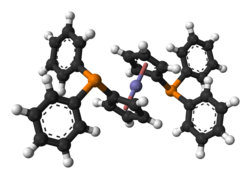Dppf
 |
|
 |
|
| Names | |
|---|---|
|
IUPAC name
1,1'- bis( diphenylphosphanyl) ferrocene
|
|
| Other names
1,1'- Bis( diphenylphosphino) ferrocene, 1,1'- Ferrocenediyl- bis(diphenylphosphine), Dppf, 1,1'- Ferrocenebis (diphenylphosphine)
|
|
| Identifiers | |
|
3D model (JSmol)
|
|
| ChEBI | |
| ChemSpider | |
| ECHA InfoCard | 100.167.773 |
|
PubChem CID
|
|
|
|
|
|
| Properties | |
| C34H28FeP2 | |
| Molar mass | 554.391 |
| Melting point | 181 to 183 °C (358 to 361 °F; 454 to 456 K) |
| Hazards | |
| Main hazards | Toxic |
| R-phrases (outdated) | R25 |
| S-phrases (outdated) | S28A S45 |
|
Except where otherwise noted, data are given for materials in their standard state (at 25 °C [77 °F], 100 kPa).
|
|
|
|
|
| Infobox references | |
1,1'-Bis(diphenylphosphino)ferrocene, commonly abbreviated dppf, is an organophosphorus compound commonly used as a ligand in homogeneous catalysis. It contains a ferrocene moiety in its backbone, and is related to other bridged diphosphines such as 1,2-bis(diphenylphosphino)ethane (dppe).
This compound is commercially available. It may be prepared by treating dilithioferrocene with chlorodiphenylphosphine:
The dilithiation of ferrocene is easily achieved with n-butyllithium in the presence of TMEDA. Many related ligands can be made in this way. The Fe center is typically not involved in the behavior of the ligand.
Dppf readily forms metal complexes. The palladium derivative, (dppf)PdCl2, which is popular for palladium-catalyzed coupling reactions, is prepared by treating dppf with the acetonitrile or benzonitrile adducts of palladium dichloride:
...
Wikipedia
